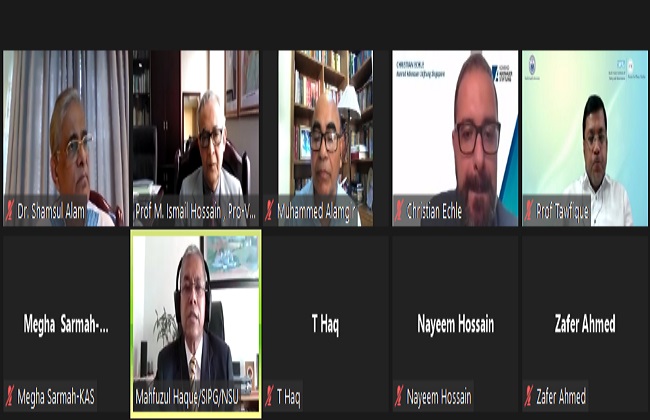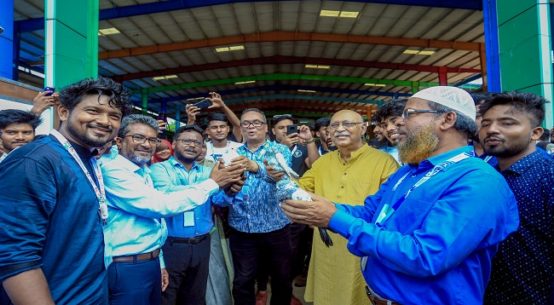
The virtual National Seminar titled “Accelerating Progress and Equity in Education during the Pandemic in Bangladesh” (18-19 September 2021) is being organized by the South Asian Institute of Policy and Governance (SIPG) at North South University (NSU) and KASpaces of the Konrad Adenauer Stiftung (KAS), Germany. The purpose of the national seminar is to share experiences and address the challenges of SDG 4, which is to ensure inclusive and equitable quality education and promote lifelong learning opportunities for all in this pandemic. There will be 4 business sessions in this national seminar on thematic areas of: blended education, infrastructural and teachers’ development, digital divide in education sector and new actors of education. Mr. M A Mannan, MP, Hon’ble Minister, Ministry of Planning, Government of Bangladesh will be present as the Chief Guest in the closing session on September 19, said a press release.
“The government is planning to raise the education expenditure to 3.5% of the GDP by the fiscal year 2025,” said Dr. Shamsul Alam, Hon’ble State Minister, Ministry of Planning, Government of Bangladesh while inaugurating the two-day virtual national seminar on 18 September 2021. He graced the inaugural session of the seminar as the Chief Guest. He emphasized the role of educational institutions to produce qualified, tech-savvy, and skilled human resources for a knowledge-based society to meet the challenges and demands of the 4th industrial revolution. He also lauded the national seminar to be very timely and hopes that the ideas and experiences that will be shared in this virtual seminar will help to accelerate progress in our educational sector amid the pandemic. Dr. Shamsul Alam also opined that the educational management needs to be more transparent, inclusive and of international standards to implement the SDG 4 i.e., quality education in Bangladesh.
“Students of our country have suffered the most during the pandemic”, said Special Guest Professor Dr. MuhammedAlamgir, Member, University Grants Commission (UGC) of Bangladesh in the seminar. He added that extensive research in education, particularly at the tertiary level is a must and new challenges created by the pandemic should be addressed not only holistically, but also intelligently. He also laid emphasis on changing our mindset according to the reality of today’s world and said that a ‘blended learning model’ could play a key role to guarantee uninterrupted education in the future.
Professor M. Ismail Hossain, Pro-Vice-Chancellor, North South University chaired the session. He spoke about the vicious cycle of low-quality education in Bangladesh and the importance of conducting research (both in the public and private sector) to figure out ways to break the cycle to produce good quality and employable graduates. He also pointed towards the inefficiency in resource utilization in the education sector calling for a shift in the mindset for the proper usage of resources.
“Leaving no one behind is the mantra of SDG goals 2030 which is very important for the world and Bangladesh,” stated Mr. Christian Echle, Director, Regional Program Political Dialogue Asia of Konrad Adenauer Stiftung (KAS).
The inaugural program began with the welcome speech of Prof. Sk. Tawfique M. Haque, Director of SIPG. He said that simply unlocking the doors of schools and colleges will not be sufficient to cover the loss within the education sector caused by the pandemic.
The inaugural session ended with the vote of thanks by Dr. M MahfuzulHaque, Faculty, SIPG, NSU. Academics, researchers, primary and secondary school teachers, college administrators, local-level education officials, representatives from the Ministry of Education, Ministry of Planning, journalists, and students were present among the participants.

